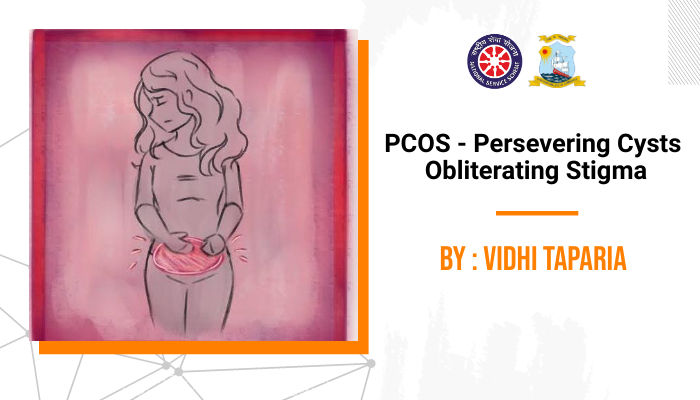
According to joint research conducted by AIIMS and Sher-i-Kashmir Institute of Medical Sciences (SIMS), over 20-25% of women in India are afflicted with PCOS – Polycystic Ovary Syndrome. This, coupled with the fact that in 75% of cases, the female is not aware of her condition, highlights the seriousness surrounding this disorder. Doctors and gynecologists stress the need to make women aware of this endocrine disorder that can lead to further complications if left untreated.
So what exactly is PCOS?
The medical explanation of PCOS is that the ovaries (the female reproductive organs ) begin to develop small cysts (nodules) within themselves. Cysts are follicles that are nothing but immature eggs incapacitated to spark ovulation.
A little throwback to tenth grade Science is in order here.
Eggs are instruments of reproduction, while ovulation is the process of discharging such eggs on maturity. At times these eggs do not mature and hence are not released out of the ovaries. As a result, they cluster together and form tumors or sacs within the ovaries (these can be either benign or malignant). These developments categorize PCOS.
PCOS can occur anytime during the reproductive age of a woman from 12-45 years. Interestingly and unfortunately, the exact cause is yet to be discovered. Some medical scholars suggest this is because of insulin resistance or inflammation (swelling in the body), however, the most plausible reason seems to be genetic inheritance ( studies show that a mother with PCOS has 40% chances to pass it on to her child) and issues in lifestyle patterns (inadequate and unhealthy diet, lethargic and dull routine, etc).
Higher levels of male hormones and irregular periods are some typical features associated with PCOS. Hormones are to the human body what Spinach is to Popeye, or the Omnitrix to Ben 10; they help regulate our body processes internally. The only difference between these energy sources of our favorite fictional characters and hormones is that the latter is released of its own accord and that hormones can have adverse effects.
Among women, both male and female hormones are present with the androgens (male hormones) getting converted into estrogen (female hormones). PCOS causes hormonal imbalance in the body as a result of increased androgen levels. This results in the emergence of 'masculine' characteristics in the female body like excess facial or body hair growth (hirsutism), oily skin leading to acne, and male-like baldness pattern. It also leads to irregular periods, heavy flow during menstruation, darkening of the skin near the armpit, groin region, and other parts, and sleep apnea (frequent disturbances in sleep due to breathing problems).
Research suggests 70% of the infertility cases are those of women with PCOS. PCOS does not necessarily imply infertility, however, it increases the chances of difficulties in conceiving a child. It can gradually also lead to High Blood Pressure, High Cholesterol, Type 2 Diabetes, and thereby increase chances of cardiac troubles, and ovarian cancer in some cases.
This is not it. The impact of PCOS is often neglected. PCOS can cause mood disorders and can become a root cause of mental health problems too – depression, anxiety, and stress – if nothing is done.
This occurs not just because of PCOS but, also due to the societal pressure put over a woman on account of her having PCOS. This further necessitates the need to spread awareness on PCOS to normalize and remove the stigma attached to it.
Notwithstanding the quantum leaps that science has made in the present, biologists have been relatively unsuccessful in finding out a cure to this syndrome. Even its diagnosis is very difficult and requires extensive tests. However, it is observed that the condition can be kept under control by taking certain measures.
1. Oral Contraceptive Pills – Birth Control Pills, Clomid, Metformin are often prescribed by doctors to keep hormonal balance. Certain times FSH (Follicle Stimulating Hormone) or progesterone pills are given to lower Androgen levels. However, taking these without the doctor's recommendation is not a good idea.
2. Exercise and Diet – Exercising daily, having protein and high-fiber rich food intakes, and Vitamin C in the diet help.
3. Acupuncture – Research suggests the management of symptoms and weight is possible with acupuncture in some cases of PCOS. However, it does not always guarantee results.
4. Regular Monitoring – PCOS is not like your regular flu which can be cured by ‘dadi-nani ka jadui nuskha’ or ‘kadha and Jadi Buti’. It requires regular surveillance and monitoring by doctors.
Is It Normal?
One might be worried about acquainting oneself with this disease, because of the difficult terms that are found here. However, in reality, its mass prevalence presents a different picture; it is a normal disease, at least as normal as a disease can be. Although, it does require significant steps and regular check-ups to be taken.
What is not normal is how it still is not being talked about in society with an open mind. People often attach stigma with the ones afflicted with this disease as they equivocate infertility with PCOS. Nevertheless, normalizing PCOS is a process actively in work. A Delhi-based writer and academician Shruti Buddhavarapu wrote about famous pop-culture icons (Nancy Drew, Alice in Wonderland, and Jane Eyre) struggling with PCOS. It is not much, however, it is a start.
As a reader, one must question the significance of this article. Those of you who have experienced symptoms like irregular periods, heavy flow, mood swings, excessive facial hair growth, and acne should immediately approach a doctor to get medical assistance.
And, even if you don’t experience these symptoms, you should not wait for another movie like ‘Padman’ to educate yourself. It is time to remove the stigma, and instead garner support and awareness.

Opmerkingen